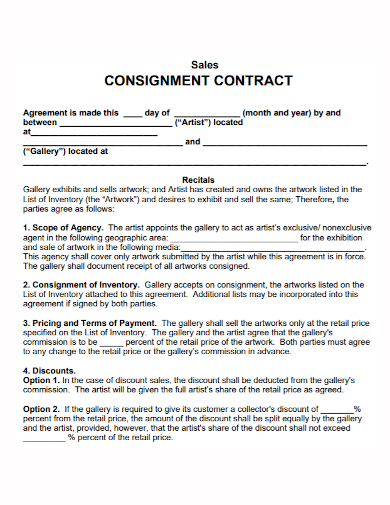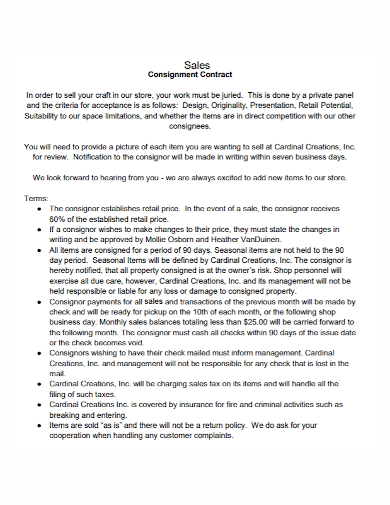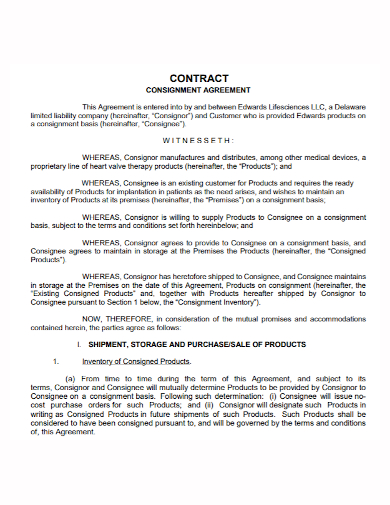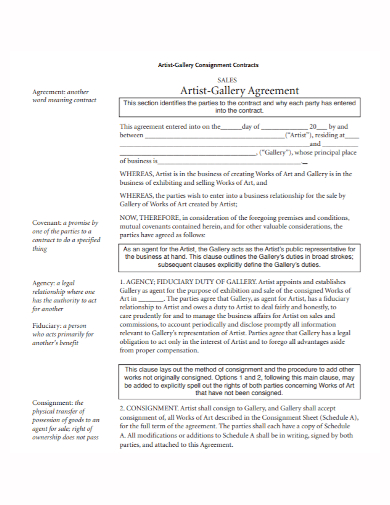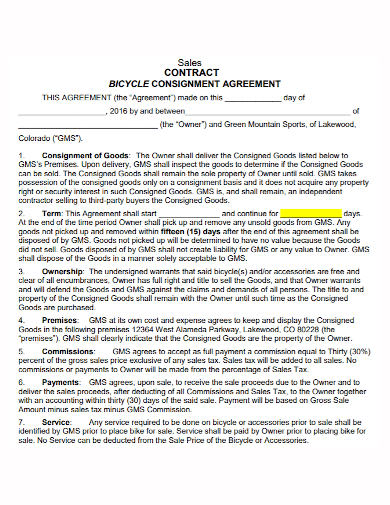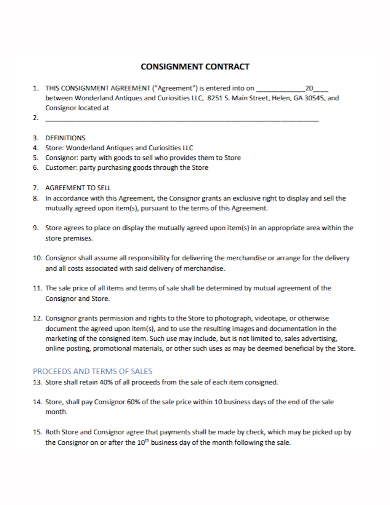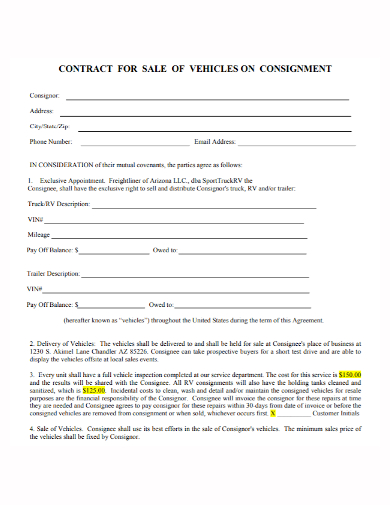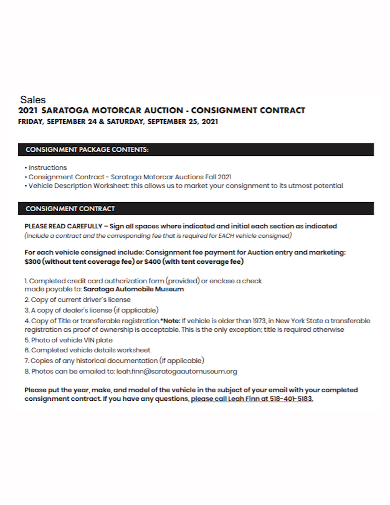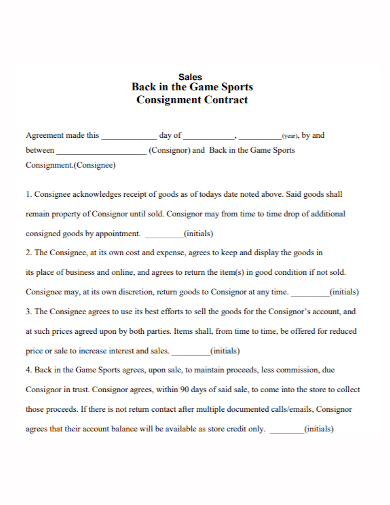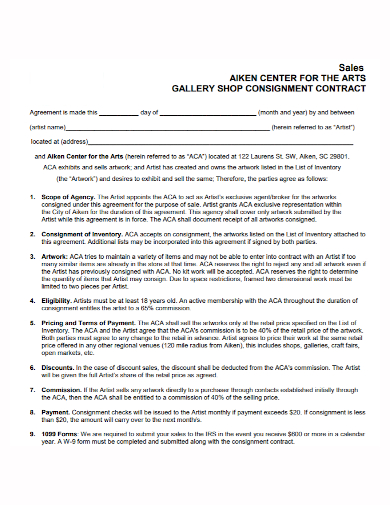A consignment contract is a contract between someone who wants to sell something and someone or a company who agrees to sell it on their behalf. In exchange, the person who is selling the item pledges to pay the seller a percentage of the sale price or a set amount for their services. Because this could be a legally binding contract, make sure the terms are explicit (such as a description of the object and the amount owed for selling it) and equitable to both parties. Before signing it, make sure you read everything.
10+ Sales Consignment Contract Samples
1. Sales Consignment Contract Template
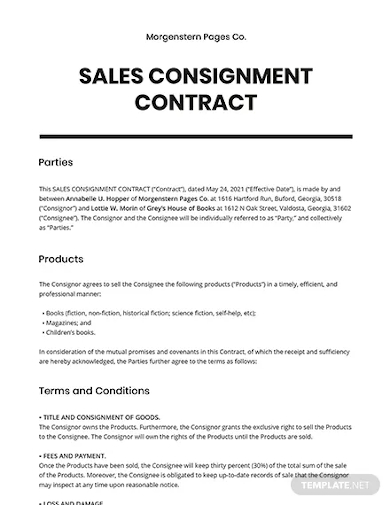
2. Sales Consignment Contract
3. Sample Sales Consignment Contract
4. Product Sales Consignment Contract
5. Artist Gallery Sales Consignment Contract
6. Bicycle Sales Consignment Contract
7. Standard Sales Consignment Contract
8. Vehicle Sales Consignment Contract
9. Sales Auction Consignment Contract
10. Sports Sales Consignment Contract
11. Gallery Shop Sales Consignment Contract
What is Sales Consignment Contract?
A consignment contract is a contract between the consignee and the consignor. The consignee agrees to keep, transfer, or sell an object belonging to the consignor. The consignee is an agent who works on behalf of the consignor to sell goods to a third party. The normal consignment contract will include a selling or service charge for the consignee, with the remaining earnings going to the originating party. A consignment contract should follow the same framework as any other legal transaction. Both parties’ information, including contact information, should be included in the contract. Specific information concerning the items, such as where the goods will be housed, the sales price, what will happen to the unsold goods, and what the consignee’s charge is for each item, should also be provided. Any additional information concerning the consignment sale and the consignee’s preferences should be supplied.
What to Include in Sales Consignment Contract?
The complete relationship between the consignor and the consignee should be outlined in your consignment agreement. It should also specify the procedure for selling items and aim to reduce the likelihood of a dispute.
The following are some general guidelines to follow when drafting a consignment agreement:
– double-checking that the contract appropriately reflects your intentions;
– ensuring that the agreement’s details are written in a clear and concise manner. Make no assumptions;
– signing and completing it prior to any transactions;
– talking with the other side about the agreement before writing it out; and
– Allowing plenty of time for you and the other party to think about the agreement before signing it.
The consignment contract protects both parties during the transaction, which may last for a long time. A good consignment agreement will also include information about what to do if something goes wrong, such as a dispute resolution strategy and applicable law. Information about insurance coverage and who bears the risk of loss should be included in the contract.
For formalities:
The parties to a consignment agreement are normally identified in the first section of the agreement. The consignor is the individual who provides the products, while the consignee is the one who receives and sells them. The agreement will usually clarify the nature of the transaction and why the parties are engaging in a consignment agreement in the “recitals” section.
FAQs
How does consignment agreement works?
Consignment agreements allow a consignee to sell items for a consignor without having to buy the products themselves. On the sale of committed goods, the consignee receives a commission. A consignment agreement allows businesses to sell products without having to buy them. The resale market for luxury goods is frequently in demand, and owners of old luxury goods might choose to consign their possessions.
What are consignment payment terms?
Consignment payment terms specify how and when the consignor will be paid. Payment conditions can include how payments will be paid, how frequently payments will be made, and when payments will be due throughout each payment period.
What if the items on consignment do not sell?
It’s crucial to include this scenario in your consignment agreement so that both parties know what to do if the products on the consignment don’t sell.
A consignment agreement might be a terrific method to hire a company to help you market and sell your products. It is critical to have a well-drafted consignment agreement in place to minimize the risk of disputes and litigation. Check out some of the sales consignment contract samples and templates supplied in the post for your reference if you want to see additional samples and forms.
Related Posts
Sample Excuse Letter for School
Feature Writing Samples
FREE 10+ Security Guard Contract Samples in PDF | MS Word
FREE 10+ Option to Purchase Agreement Samples in MS Word | Apple Pages | PDF
FREE 26+ Curriculum Form Samples in MS Word | PDF
FREE 20+ Cleaning Service Proposal Samples in PDF | MS Word
FREE 29+ Sample Loan Application Form Templates in MS Word | PDF
FREE 10+ Event Venue Contract Samples in PDF | MS Word | Pages | Google Docs
FREE 10+ SBAR Samples in PDF | DOC
FREE 12+ Music Band Contract Templates in PDF | MS Word
FREE 10+ HVAC Maintenance Contract Samples in PDF | MS Word
FREE 10+ Social Media Marketing Contract Samples in MS Word | PDF
FREE 10+ Wholesale Assignment Contract Samples in PDF
FREE 18+ Financial Proposal Samples in PDF | MS Word | Google Docs | Pages
FREE 10+ Feasibility Study Samples in PDF

